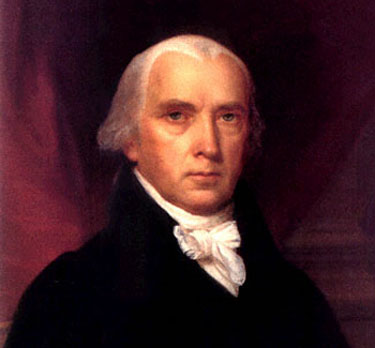(image from PBS.ORG)
This doctrine is based on a number of fallacies, the most important of which is the assumption that the Constitution was ever intended to be some sort of "sacred writ" immune from interpretation.
The Constitution was (and remains) an explicitly POLITICAL document, in that it was written as it was with the intent of garnering sufficient political support to insure its ratification. When the Framers couldn't garner enough consensus in their ranks regarding a particular topic, they had recourse to a heirarchy of tactics in writing text that was acceptable to a sufficient number of delegates.
As a first resort, they would compromise. We see this in "the great compromise" which resulted in the creation of a bicameral legislature. We also see it in the frequently misunderstood 3/5ths compromise.
(image from the B.S. Report)
However, the Framers frequently couldn't compromise, either. In such cases, they would intentionally leave the language of the Constitution vague. An example of this intentional vagary can be seen in the tension between the President's role as "Commander in Chief" and the enumerated powers of Congress over the military. The "plain language" of Article I gives control of the military budget to Congress. However, the "plain language" of Article II makes the President the final authority regarding military operations. Can Congress prevent a military operation by refusing to fund it? Can the President order a military operation without obtaining a Congressional appropriation?
We don't know what the Framers thought about this, because the "Framers" disagreed on the subject. The "original intent" of the Framers was different from faction to faction. Consequently, the determination of these questions has been left to 1) the Supreme Court, which has frequently refused to intervene in disputes between the other two branches and 2) established precedent. In the example of military authority, the relevant precedent was set by Theodore Roosevelt. When Congress refused to appropriate money to send "The Great White Fleet" on a show-the-flag tour of the world, Roosevelt ordered them to sail halfway round the world. Congress then had to appropriate enough money to get the fleet back to the United States, completing the circumnavigation. 3) Clarifying legislation, such as the War Powers Act, which every subsequent President has insisted is unconstitutional.
(image from kirkwoodk12.mo.us)
On certain issues, the Framers couldn't compromise, and neither side would tolerate vague language regarding the issue. In such cases, the Framers would insert both mutually contradictory directives in the Constitution, so that each side could point to a particular provision and claim victory. The best known example of this is the flatly irreconcilable vision of Federal power made in the "necessary and proper" clause in Article I, Section 8, and the 10th Amendment.
In cases where the Framers deliberately tried to have it both ways, the Supreme Court has been stuck trying to untangle the mess. The best example of this is the case of McCullough v. Maryland, where the Supreme Court explicitly rejected the idea that Congress was limited to those powers explicitly granted to it in Article I section 8, (with all other powers being reserved to the States) and instead embraced a more expansive view of Federal power based on the idea of "implied powers", i.e. powers the Feds can safely be assumed to have simply because governance is impossible without them. Subsequent Supreme Court decisions have extended and reinforced this view, and constitute a complete refutation (refudiation?) of the central tenet of the Tea Bagger view of Federal power.
Finally, when the Framers couldn't compromise, couldn't fudge, couldn't agree to have it both ways...
they simply ignored the issue. The best example of this is the question of slavery, both in new states and in the free states. This particular tactic lead us into the Civil War.
Another hole in the strict constructionist view of the Constitution is the fact that the Framers themselves explicitly repudiated the doctrine. James Madison refused to make his notes from the Constitutional Convention public for two decades, because he didn't want them being used to determine "original intent" in interpreting the Constitution. George Washington didn't believe the Constitution would remain in effect more than 20 years or so. And Thomas Jefferson (more properly viewed as a "Founding Father" than as a "Framer" explicitly disavowed the original intent doctrine in a letter he wrote to Madison in 1789, in which he asserted "...the earth belongs in usufruct to the living: that the dead have neither rights nor powers over it."
Any appeal to the original intent of the framers is contrary to the original intent of the Framers.
(image from visitingdc.com)
Conservatives will object to my arguments on the basis of "consequence" (or, the fallacy of the slippery slope). If the meaning of the Constitution is open to interpretation, what keeps any potential tyrant from deciding the Constitution allows him to become dictator?
The answer is obvious. It is not the responsibility of dead men to protect us from tyranny, it is our own responsibility. The dead men have given us the best possible guidance in doing so, but that guidance consists of hints, general principles and precedent. They have not given us a sacred document that must be read according to the "jot and tittle" standard applied by crazy fundamentalists to the Bible.
(image from vaticanassassins.org
Finally, the whole notion of judicial conservatism is merely a political slogan designed to delegitimize progressive judicial decisions. Conservative jurists are every bit as activist as liberal jurists, as is shown by the Supreme Court's recent decisions in Citizens United and the lifting of Chicago's gun ban.
When you overturn 200 years of stare decisis, you're a fucking activist.
(image from enormousthrivingplants.blogspot.com













